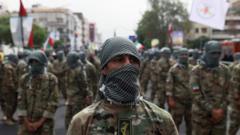Rising international threats from Iran have surfaced, detailing the regime’s recruitment of criminal networks for assassination plots abroad. Intelligence reports indicate a connection between Iran's Revolutionary Guards and gangs like the Thieves-in-Law, heightening concerns over safety for dissidents worldwide.
Iran's Alleged Use of Criminal Syndicates for Foreign Assassinations

Iran's Alleged Use of Criminal Syndicates for Foreign Assassinations
Recent investigations reveal Iran’s Revolutionary Guards are allegedly outsourcing hit jobs to organized crime gangs to target dissidents globally.
In a troubling development over Iran’s international activities, recent investigations have unveiled that the Islamic Revolutionary Guard Corps (IRGC) appears to be enlisting criminal organizations to execute assassination plots outside of its borders. Western intelligence agencies are raising alarms about a new surge in endeavors by Iran to sideline dissidents, journalists, and political opponents residing abroad, with noteworthy incidents having escalated since the year 2022.
Among the alleged targets of these nefarious operations include high-profile individuals such as former US President Donald Trump. Reports note that the UK police are scrutinizing a series of arrests involving individuals accused of plotting a terrorist act intended for the Israeli embassy in London, signaling that the scale of these operations is alarming.
Evidence presented in judicial documents from Turkey and the US reveal the IRGC's collaboration with notorious criminal syndicates to carry out targeted killings. A name surfacing prominently in these records is that of Naji Sharifi Zindashti, an Iranian mob leader infamous for his extensive drug trafficking activities. His alleged involvement is noticeably linked to the 2017 assassination of Saeed Karimian, a Persian media figure, which Iranian authorities viewed as a threat to their ideological stance.
The situation further complicates with Zindashti’s name surfacing again in the 2021 plot to assassinate two Iranian defectors in the United States, where he purportedly communicated with a member of the Hells Angels biker gang about executing the scheme. The FBI intervened before any harm could be done, nonetheless, the pattern of criminal elements intersecting with Iran’s state apparatus reiterates a concerning trend.
Authorities have observed connections between the IRGC’s Quds Force and organized crime groups, such as the Thieves-in-Law, aiding in the facilitation of IOs regarding kidnapping and assassination. Recent convictions have indicated that these gang affiliations are not merely coincidental; they reflect an organized effort to dismantle opposition through illicit means.
Concerns over Iranian retaliation against former US officials linked to the 2020 killing of IRGC commander General Qasem Soleimani have compounded reactions from the international community. A series of sanctions have been enforced by both the US and UK targeting individuals associated with these plots, reaffirming their stance against Iran’s aggressive inclinations.
Moreover, the threat landscape has widened, with UK counter-terrorism police reporting credible threats against several individuals, alongside foiled attempts at violent actions against prominent Iranian activists residing in London. There is an ongoing effort among security services to penetrate these criminal networks that mingle with Iran’s machinations, aiming to safeguard individuals targeted by the Iranian regime.
As the landscape of international espionage morphs, the integration of organized crime into state-sponsored operations highlights a new paradigm in Iran’s approach to silencing dissent and advancing its geopolitical objectives. With historical precedents of violence underpinning the Iranian regime’s tactics, the global community watches closely, given the implications for diplomatic relations and international security.
Among the alleged targets of these nefarious operations include high-profile individuals such as former US President Donald Trump. Reports note that the UK police are scrutinizing a series of arrests involving individuals accused of plotting a terrorist act intended for the Israeli embassy in London, signaling that the scale of these operations is alarming.
Evidence presented in judicial documents from Turkey and the US reveal the IRGC's collaboration with notorious criminal syndicates to carry out targeted killings. A name surfacing prominently in these records is that of Naji Sharifi Zindashti, an Iranian mob leader infamous for his extensive drug trafficking activities. His alleged involvement is noticeably linked to the 2017 assassination of Saeed Karimian, a Persian media figure, which Iranian authorities viewed as a threat to their ideological stance.
The situation further complicates with Zindashti’s name surfacing again in the 2021 plot to assassinate two Iranian defectors in the United States, where he purportedly communicated with a member of the Hells Angels biker gang about executing the scheme. The FBI intervened before any harm could be done, nonetheless, the pattern of criminal elements intersecting with Iran’s state apparatus reiterates a concerning trend.
Authorities have observed connections between the IRGC’s Quds Force and organized crime groups, such as the Thieves-in-Law, aiding in the facilitation of IOs regarding kidnapping and assassination. Recent convictions have indicated that these gang affiliations are not merely coincidental; they reflect an organized effort to dismantle opposition through illicit means.
Concerns over Iranian retaliation against former US officials linked to the 2020 killing of IRGC commander General Qasem Soleimani have compounded reactions from the international community. A series of sanctions have been enforced by both the US and UK targeting individuals associated with these plots, reaffirming their stance against Iran’s aggressive inclinations.
Moreover, the threat landscape has widened, with UK counter-terrorism police reporting credible threats against several individuals, alongside foiled attempts at violent actions against prominent Iranian activists residing in London. There is an ongoing effort among security services to penetrate these criminal networks that mingle with Iran’s machinations, aiming to safeguard individuals targeted by the Iranian regime.
As the landscape of international espionage morphs, the integration of organized crime into state-sponsored operations highlights a new paradigm in Iran’s approach to silencing dissent and advancing its geopolitical objectives. With historical precedents of violence underpinning the Iranian regime’s tactics, the global community watches closely, given the implications for diplomatic relations and international security.























